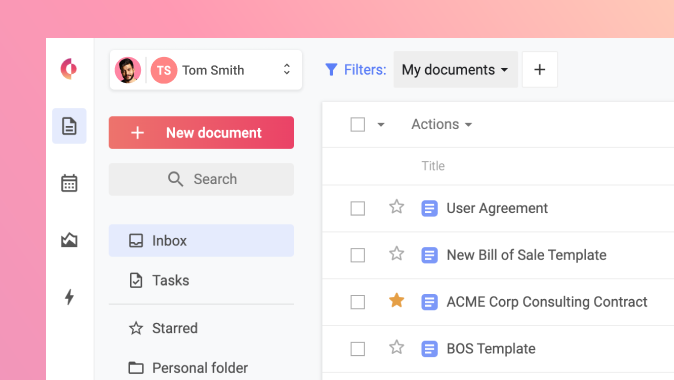E-signature Frequently Asked Questions
In today’s digital age, electronic signatures have become an essential tool for businesses and individuals alike. E-signatures allow for documents to be signed almost instantly, without the need to print them out and physically give them to someone to sign. In this article, we will answer some frequently asked questions about e-signatures, including what they are, how to create them, and their legal standing. We will also discuss the differences between electronic and digital signatures, limitations on when and where they can be used, and the costs associated with e-signature software.
An e-signature is a tool for you to sign documents online, without having to print out and send paper. It helps increase business efficiency and makes the signing process much easier, quicker, and better organized. It’s a user-friendly way to indicate agreement or provide consent on electronic documents. It’s easy to use and can take various forms, such as a scanned image of a handwritten signature, a typed name, and surname, or your signature drawn online using a mouse or laptop touchpad.
In the United States, e-signatures are legal and governed by the Electronic Signatures in Global and National Commerce (ESIGN) Act, which defines an e-signature as “an electronic sound, symbol, or process attached to or logically associated with a contract or other record and executed or adopted by a person with the intent to sign the record.” The European Union also has a regulation in place, the eIDAS Regulation, which provides a similar legal framework for electronic signatures.
Creating an e-signature is a simple and straightforward process. There are several ways to create an e-signature, such as typing in your full name, drawing your signature using a mouse or laptop touchpad, or uploading an image of your signature. Creating an electronic signature requires using e-signature or contract lifecycle management software. Read on to learn more about e-signature tools.
Certainly! Electronic signatures are recognized as legally binding in many countries, including the United States and the European Union. In the United States, the Electronic Signatures in Global and National Commerce (ESIGN) Act and in the European Union, the eIDAS Regulation, provide the legal framework for electronic signatures. Both acts define an electronic signature as data attached to a record, and state that electronic signatures are legally binding and enforceable.4.
It’s important to note that there are some exceptions to the use of electronic signatures, such as for certain types of contracts or documents that are required to be in writing, such as wills or deeds. However, in most cases, especially in a business context, e-signatures are a legally-valid way to sign documents and contracts.
For an e-signature to be legal, it must be created with the intention to sign the document, must be unique and verifiable, and must be created using secure and tamper-evident technology. Creating an e-signature with intent means that the signer must have the intention to sign the document using the e-signature tool and must understand that they are legally binding themselves to the document. As said, the e-signature must also be unique to the signer and must be verifiable. This means that the e-signature has to be associated with the person signing the document and it has to be possible to verify this by a third party.
Finally, the e-signature must be created using technology that is secure and tamper-evident. This means that the e-signature technology must be designed to prevent unauthorized access or tampering and must provide evidence of any changes made to the document after it has been signed. Additionally, the document must be in a format that is not easily alterable and the signer must be able to retain a copy of the signed document.
Yes, e-signatures are considered legally binding and will hold up in court as long as they meet the legal requirements outlined in the US ESIGN Act and the EU eIDAS Regulation.
The validity of an electronic signature is determined by whether it meets the legal requirements set out in the relevant laws or regulations in the given jurisdiction. The requirements may include factors such as the signature’s authenticity, integrity, non-repudiation, and whether the signature links to the data being signed. Overall, an electronic signature is considered legally binding and enforceable in many situations as long as it satisfies the legal requirements and standards set by the applicable laws or regulations.
In general, e-signatures can be used in a wide range of situations, including employment contracts, NDAs, sales contracts, service agreements, partnership agreements, and many other legal documents. However, there may be some limitations to when or where you can use an e-signature, depending on the laws and regulations in your country or jurisdiction.
For example, some types of documents may require a physical signature, such as wills, deeds, and powers of attorney. Additionally, some countries may have specific requirements or regulations for the use of e-signatures, such as the need to use a certain type of e-signature technology or the requirement to obtain consent from all parties involved. In terms of location, you can use e-signatures from anywhere with an internet connection, which makes them convenient for remote or international business transactions.
If you’re unsure whether a given document can be e-signed, you can asl your e-signature tool provider or consult the e-signature regulations applicable in your country: US Electronic Signatures in Global and National Commerce Act (ESIGN), EU eIDAS Regulation, Canada Electronic Signatures Regulations.
7. What’s the difference between an electronic signature and a digital signature?
While the terms “electronic signature” and “digital signature” are often used interchangeably, they are not the same thing. An electronic signature is a broad term that refers to any method of signing a document electronically, including typed names or scanned images, attached to a record with the intent to sign.
A digital signature, on the other hand, is a specific type of electronic signature that uses encryption technology to verify the authenticity of the signatory and ensure the integrity of the signed document. Digital signatures use a certificate-based digital ID issued by a trusted third-party, or certificate authority (CA), to bind a digital signature to a specific signatory. Digital signatures typically require specialized software and a hardware token to create, sign, and verify the signature.
8. How much does e-signature software cost?
E-signature tool prices vary, starting from free to around $60 per user per month. In many cases, payments are based on a monthly or annual subscription. The cost of e-signature software varies depending on the quality of the tool, its features, and its functionalities.
Instead of choosing a simple e-signature tool, it is worth considering buying a complete contract management software, which can be similar in price but give you many more options and benefits. Read an article about why contract management software is often a better choice.
9. What is the best software for electronic signatures?
Some of the best e-signature tools include Concord, DocuSign, Dropbox Sign, PandaDoc, and Adobe Sign. However, what will be the best for you depends on your business needs and the functionalities you require.
Some frequently requested e-signature tool features include:
- Safe and secure electronic signatures
- Legally binding e-signatures that comply with regulations
- Generous monthly limits for e-signatures
- User-friendly tool
- Flexibility in the number of user seats and e-signature limit
It is also extremely important to evaluate the safety and compliance of e-signature software. Below is a list of some of the best practices to look for in your future e-signature tool provider.
- Compliance with electronic signature standards and regulations to make sure your e-signatures will be legally binding: US Electronic Signatures in Global and National Commerce Act (ESIGN), EU eIDAS Regulation, and Canada Electronic Signatures Regulations.
- Data encryption at rest and in transit so that your information is secure and protected.
- Data is stored on secure, reliable, and accredited servers.
- Third-party security audits and certifications, for example, SOC2.
- Safety of your account, for example with two-factor authentication or SSO.
E-signatures for your business
E-signatures have become an essential tool for businesses and individuals alike in today’s digital age, so it’s important to learn about them. We hope our article has helped you understand more about e-signatures.
E-signatures are legally binding and recognized in many countries, including the United States and the European Union. They are easy and convenient to use, can increase business efficiency, and make the signing process much easier. If you are not using e-signature software yet, we highly recommend giving it a try!



